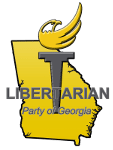Libertarian Party of Georgia | |
|---|---|
 | |
| Founded | 1972 |
| Ideology | Libertarianism [1] Non-interventionism [2] Fiscal conservatism [3] Economic liberalism [3] Cultural liberalism [3] Laissez-faire [3] Classical liberalism [3] |
| National affiliation | Libertarian Party (United States) |
| Colors | Gold |
| Georgia Senate | 0 / 56 |
| Georgia House of Representatives | 0 / 180 |
| U.S. Senate (Georgia) | 0 / 2 |
| U.S. House of Representatives (Georgia) | 0 / 14 |
| Other elected officials | 0 (June 2024) [update] [4] |
| Website | |
| lpgeorgia.com | |
Founded in 1971, The Libertarian Party of Georgia is a state affiliate of the United States Libertarian Party.